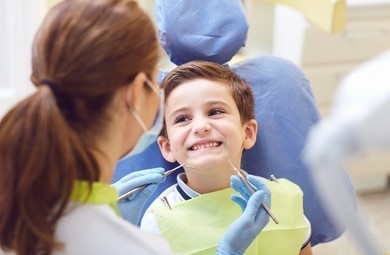
Common Pediatric Dental Issues And How To Prevent Them ** ( Apr 19, 2024 )
Category : Pediatric Dental Issues
Pediatric dental care is an essential part of ensuring your child's overall health and well-being. Developing good oral hygiene habits early on can set the foundation for a lifetime of healthy teeth and gums. However, children are susceptible to a range of dental issues that can impact their oral health if not addressed promptly. This article explores common pediatric dental issues and provides tips on how to prevent them.
1. Tooth Decay (Cavities)
Tooth decay is one of the most common pediatric dental issues. It occurs when bacteria in the mouth break down sugars from food and produce acid, which erodes the tooth enamel.
Prevention Tips:
Regular Brushing and Flossing: Encourage your child to brush their teeth twice a day and floss daily to remove plaque and food particles.
Limit Sugary Snacks and Drinks: Reduce your child's intake of sugary foods and beverages, as they can contribute to tooth decay.
Use Fluoride: Fluoride strengthens tooth enamel and helps prevent cavities. Ensure your child uses fluoride toothpaste and consider fluoride treatments at the dentist.
Regular Dental Check-Ups: Schedule regular dental visits for professional cleanings and early detection of cavities.
2. Gum Disease
Gum disease, or gingivitis, is an inflammation of the gums caused by plaque buildup. Gums that swell, turn red, and bleed may result from it.
Prevention Tips:
Proper Oral Hygiene: Encourage your child to brush and floss regularly to remove plaque and prevent gum disease.
Monitor Brushing Techniques: Teach your child how to brush properly to ensure they clean along the gumline.
Healthy Diet: A balanced diet rich in fruits and vegetables can promote gum health.
3. Tooth Sensitivity
Tooth sensitivity in children can be caused by enamel erosion, cavities, or gum recession.
Prevention Tips:
Use a Soft-Bristled Toothbrush: A soft-bristled toothbrush is gentle on teeth and gums, reducing the risk of sensitivity.
Avoid Acidic Foods and Drinks: Acidic foods and drinks can erode enamel and contribute to sensitivity.
Maintain Good Oral Hygiene: Consistent brushing and flossing can prevent cavities and gum recession.
4. Thumb Sucking and Pacifier Use
Prolonged thumb sucking or pacifier use can lead to dental issues such as misaligned teeth and changes in the shape of the palate.
Prevention Tips:
Encourage Alternatives: Encourage your child to use other comfort objects, such as a stuffed animal or blanket, instead of a pacifier or thumb.
Positive Reinforcement: Use praise and rewards to motivate your child to stop thumb-sucking or pacifier use.
Consult Your Pediatric Dentist: If your child continues the habit beyond the age of 3-4, seek guidance from your pediatric dentist.
5. Malocclusion (Misaligned Teeth)
Malocclusion refers to misaligned teeth or a misaligned bite. It can cause difficulties with chewing, speaking, and maintaining oral hygiene.
Prevention Tips:
Early Orthodontic Evaluations: Have your child evaluated by an orthodontist at an early age to identify any potential issues and plan for future treatment.
Regular Dental Check-Ups: Regular dental visits can help detect malocclusion early and provide appropriate guidance.
6. Enamel Hypoplasia
Enamel hypoplasia is a condition in which the enamel does not form properly, leading to weak and thin enamel. Tooth sensitivity and decay risk may rise as a result.
Prevention Tips:
Follow Prenatal Care Guidelines: Pregnant mothers should receive proper prenatal care and nutrition to reduce the risk of enamel hypoplasia in their child.
Consult a Pediatric Dentist: If your child is diagnosed with enamel hypoplasia, work with your pediatric dentist to develop a treatment plan and preventive measures.
7. Dental Trauma
Children are prone to accidents that can cause dental trauma, such as chipped, fractured, or knocked-out teeth.
Prevention Tips:
Use Mouthguards for Sports: If your child participates in contact sports, have them wear a mouthguard to protect their teeth.
Supervise Playtime: Monitor your child's activities to minimize the risk of dental injuries.
Act Quickly: In the event of dental trauma, seek immediate dental care to prevent further damage.
8. Bad Breath (Halitosis)
Bad breath in children can be caused by poor oral hygiene, dental issues, or underlying medical conditions.
Prevention Tips:
Encourage Good Oral Hygiene: Brushing and flossing regularly can help prevent bad breath by removing bacteria and food particles.
Stay Hydrated: Drinking plenty of water can help wash away bacteria and keep the mouth moist.
Avoid Strong-Smelling Foods: Limit your child's consumption of foods that can cause bad breath, such as garlic and onions.
Conclusion
Preventing common pediatric dental issues is essential for your child's overall health and quality of life. By encouraging good oral hygiene habits, monitoring your child's diet, and scheduling regular dental check-ups, you can help your child maintain healthy teeth and gums. If you notice any signs of dental issues, seek guidance from a pediatric dentist promptly to address the problem and prevent further complications. Establishing healthy oral care habits early on will set your child up for a lifetime of strong, healthy teeth and a beautiful smile.
© 2021 Punhani Tooth Care. Crafted with by SINFOME
